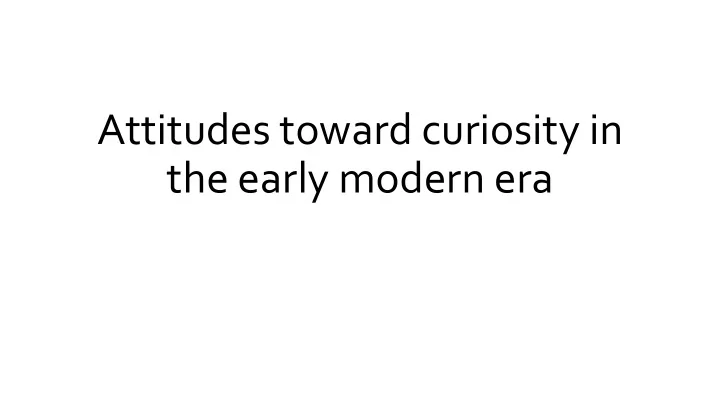

Attitudes toward curiosity in the early modern era
Research is “feeding curiosity and answering questions”
The Guardian 14 September, 2017
Part 1: pre-modern thinking about curiosity Part 2: early modern transformations
Part 1: pre-modern thinking about curiosity
• “I looked over the text of your letters and examined them with quick glimpses of my eyes and contemplated them with a certain natural curiosity for hidden things (and this, it seems, is innate in me) and admired the exuberant style and the maiden urbanity of your eloquence. ” 1 • “he had examined and understood the Sacred Scriptures with such curiositas that when he was questioned about them he always had a fitting answer and responded without delay” 1
• “[ Curiositas is] that disturbance of the human will which led to an intemperate desire for the knowledge of perishing, worldly, temporal things for the mere sake of acquiring such knowledge alone, which treated the divine mysteries as if they fit into these categories, and which, furthermore, replaced even the desire for God. ” 2 • Sinful curiosity “likened to a poison which … stole away the mind and then plunged the soul into death ” 1
• “ Eve erred in not regulating the measure of her knowledge by the will of God. ” 3 • “we all daily suffer under the same disease, because we desire to know more than is right, and more than God allows” 3
• “ general defect and imperfection proceeding from Nature corrupted, and tending to corruption, followeth all the Sonnes of Adam, and that is a certaine natural curiosity” 3 • One should “not ... bee curious in searching mysteries.” 3 • One may “desire knowledge of God, as Salomon did, but not desire knowledge as Eve did .” 3 • “We must labour to mortifie our spirituall pride, which is the mother and nurse of this idle curiosity. ” 3 • Curiosity “ puffeth them up with pride, and maketh them in the overweening conceit of their owne excellencies to contemn all others .” 3 • “Curious speculation of creautures ” serves to “divert many minds from the invisible creator unto whom the sight of these by nature not misleveled by inordinate or unyildy appetites would direct all.” 3
Part 2: early modern transformations
• True philosophy lies “buried in darkness, through the mysty and ambiguous clouds of that cavilling, brabling, heathenish Philosophy, which they so adore and follow, with their Master Aristotle , as if he were another Jesus rained down from heaven, to open unto mankind the treasures of … true wisdom.” 3
• “knowledge of the world is neither forbidden nor exceeds our capacities, [because] God has fitted the world to human capacities .” 3 • “[W] hatsoever is not God but parcel of the world, he [God] hath fitted it for the comprehension of man’s mind, if man will open and dilate the powers of understanding as he may .” 3 • “God hath framed the mind of man as a mirror or glass, capable of the image of the universal world. ” 3
• Knowledge of nature “must be subject to that use for which God hath granted it; which is the benefit and relief of the state and society of man; for other wise all manner of knowledge becometh malign and serpentine, and therefore as carrying the quality of the serpent’s sting and malice it maketh the mind of man to swell; as the Scripture saith excellently, knowledge bloweth up , but charity buildeth up .” 3 • seek it “not either for pleasure of the mind, or for contention or for superiority to others, or for profit, or fame, or power, or any of these inferior things; but for the benefit and use of life; and that they perfect and govern it in charity.” 3
• “To pry into mysteries of nature that God chose not to reveal, as the brazen magi attempted to do, was to trespass the boundary of legitimate intellectual inquiry, to challenge God’s majesty, and to enter into the territory of forbidden knowledge. ” 4
• “Certain learned men, ... ‘mounting free degree to degree, upon the slippery slope and uncertain scale of curiositie ,’ are ‘at last entised, ... where lawful artes or sciences fails, to satisfie their restlesse mindes, even to seeke to that black and unlawful science of Magick .” 3 • “their knowledge, for all that they presume thereof, is nothing increased, except in knowing evil … as Adam’s was by eating of the forbidden tree .” 3 • “the cursed art of Magick and witchcraft, as a way to get further knowledge in matters secret and not revealed. ” 3
• magic is “nothing else but the survey of the whole course of nature” 5 • magicians are “careful explorers of nature” 5
• “by welding magic’s experimental attitude to the reason of natural philosophy, he [Bacon] hoped to delineate a true and useful approach to the study of nature. While he accused astrology, natural magic and alchemy of ‘sway[ ing ] the imagination more than reason,’ he felt that they needed to be reformed rather than abandoned. ” 6
Conclusion
Sources 1. Richard Newhauser , “Towards a History of Human Curiosity: A Prolegomenon to its Medieval Phase,” Deutsche Vierteljahrsschrift 56 (1982), 559-75. 2. Gladden J. Pappin , “Directing Philosophy: Aquinas, Studiousness, and Modern Curiosity,” Review of Metaphysics 68 (2014), 313-46. 3. Peter Harrison, “Curiosity, Forbidden Knowledge, and the Reformation of Natural Philosophy in Early Modern England,” Isis 92 (2001), 265-90. 4. William Eamon, Science and the Secrets of Nature: Books of Secrets in Medieval and Early Modern Europe (Princeton, 1994). 5. John Henry, Knowledge is Power: How Magic, the Government and an Apocalyptic Vision Helped Francis Bacon to Create Modern Science (Icon, 2003). 6. Philip Ball, Curiosity: How Science Became Interested in Everything (Random House, 2012).
Recommend
More recommend